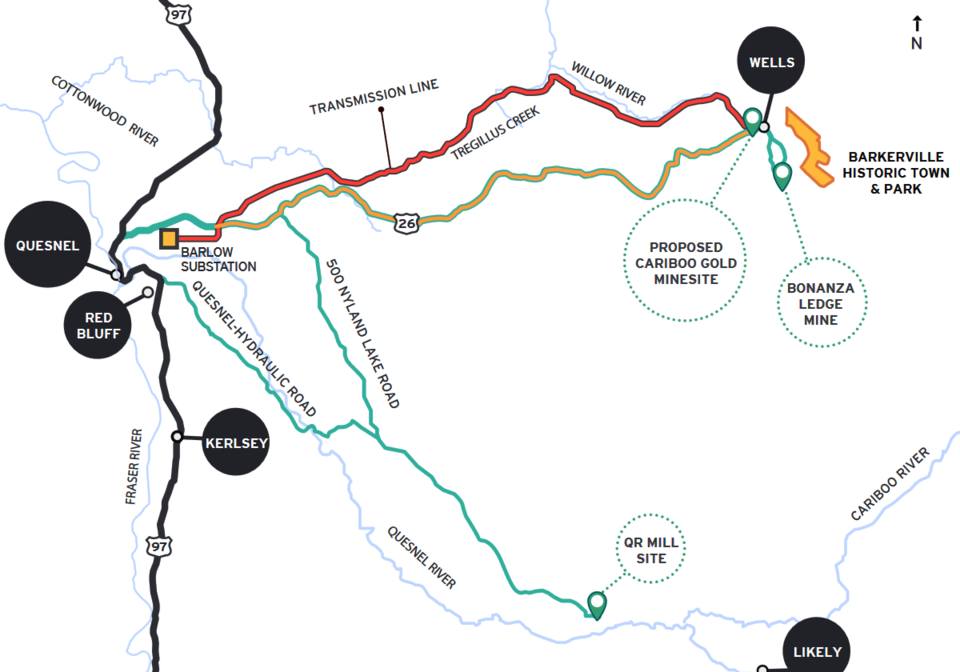The Ministry of Mining and Critical Minerals has announced that Barkerville Gold Mines, a subsidiary of Osisko Development Corp., has been granted an operating permit under the Mines Act for the Cariboo Gold Mine in Wells, located southeast of Prince George.
The underground mine is expected to employ about 634 workers during the construction phase and generate further investment, with an initial $137 million injection and an additional $918 million over the mine's expected 16-year lifespan.
"Receipt of the construction and operating permits for the Cariboo Gold Project is a major milestone and monumental achievement for Osisko Development and its stakeholders," said Sean Roosen, founder, chairman and CEO, in a statement issued by the company. "It is the culmination of almost five years of extensive discussion and consultation with provincial regulators, Indigenous nations and host communities in ensuring the project becomes a model for responsible mine development and environmental stewardship that redefines mining for a better future."
The permit follows a 13-month permitting process which included a comprehensive technical review conducted by a team of experts in collaboration with First Nations.
The project received the approval of Lhtako Dené Nation and the Williams Lake First Nation. As the process unfolded, nearby Xat艣奴ll First Nation until their concerns could be addressed and they grant consent.
"The Cariboo Gold Project represents a significant opportunity for Lhtako Dené Nation and we are pleased that it has received its BC Mines Act permits," said Lhtako Dené Nation Chief Clifford Lebrun. "The mine and its surrounding infrastructure is firmly located in our core traditional territory, and we have been active participants at every stage of the project from mineral exploration to the Environmental Assessment and the BC Mines Act permit."
Xat艣奴ll First Nation issued a statement after the news of the ministry approval was announced, expressing disappointment with the decision to grant an operating permit without first meeting with Xat艣奴ll leadership or obtaining their consent.
Xat艣奴ll raised concerns about what is described as "inconsistency" in the government’s approach, noting that while the Ministry of Environment and Parks agreed to hold a consensus-seeking meeting with the First Nation on Environmental Management Act permits, the Ministry of Mining and Critical Minerals did not.
"This discrepancy highlights troubling inconsistencies in how the Government of British Columbia engages with First Nations and signals a lack of commitment to the principles of UNDRIP," the statement reads.
The statement also notes that Xat艣奴ll First Nation, which is considering legal options, is willing to support sustainable resource development in its territory but insisted that any development must be conducted properly, with respect for their rights and laws.
The mine will have the capacity to process 1.1 million tonnes of gold-bearing ore per year and will involve underground mining operations, milling at the Quesnel River mine (58 km southeast of Quesnel), and waste rock storage at the Bonanza Ledge Mine near Barkerville. A new transmission line from the Quesnel area to the mine will also be part of the infrastructure.
A formal investment decision and the engagement on a project financing package would allow for full-scale construction to commence in the second half of 2025 with a targeted completion date at the end of 2027, the company reports.
Additionally, the Cariboo Gold project is awaiting approval for an Environmental Management Act (EMA) permit, which is expected in the weeks ahead. The EMA permit will regulate waste discharge and pollution control measures, ensuring environmental and public health protections are in place as part of the project.
This marks the first project fully assessed under the 2018 Environmental Assessment Act to be granted a Mines Act permit, the province states.




